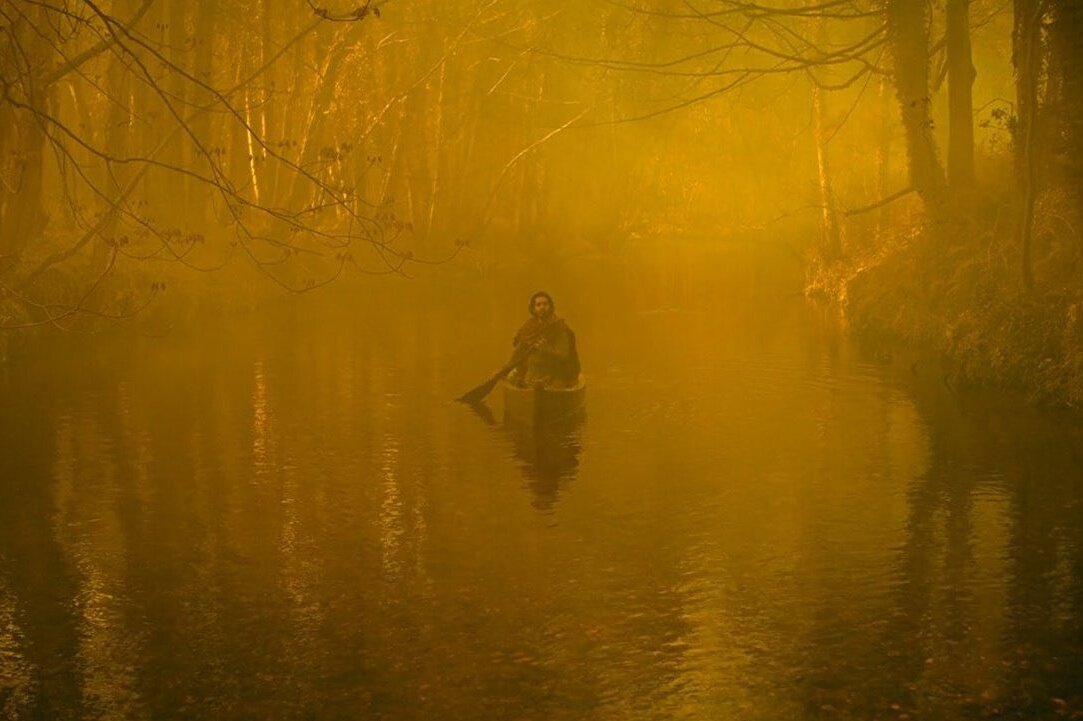Of the many humiliations faced by Great Britain since deciding to inflict lingchi on ourselves by voting for Brexit, the misappropriation of cultural icons by the Tories and their splinter far-right groups is particularly disgraceful. This death by a thousand cuts, the slow process of a lingering death often features Spitfires soaring overhead, Bobby Moore raising the World Cup aloft or knights of old with the cross of Saint George emblazoned on their shields and lances. You don’t need to borrow those special sunglasses from They Live to fully reveal the fascist iconography lurking underneath, cultivated over decades by Murdoch and his cronies.
So, it is impossible to watch The Green Knight, David Lowery’s miraculous and mesmerising adaptation on the Arthurian 14th-century poem, Sir Gawain and the Green Knight, without viewing it through the twisted prism of post-Brexit Great Britain. Once more the realms of England, Scotland, Northern Ireland, and Wales are divided, tribal leaders warring over trade routes and dominion as the land is paralysed by plague, crops left to rot in the fields and the population fractious, fearful of myth and reality alike. Not since Arthur’s melancholy when learning of Guinevere’s adultery with Lancelot has a country’s health and prosperity been fatally linked to its leader’s hubris. Unlike Arthur, we have the ignominy of being led by a vacuous cretin, whose idea of valour is rugby tackling a child in Japan.
When we meet Arthur and Guinevere in Lowery’s Camelot, they are not the social media darlings of far-right groups but sick with a deathly pallor, washed out legends about to be consigned to myth by Christianity, Arthur particularly living vicariously through the exploits of others. When he asks his ne’er-do-well nephew Gawain to regale him with his feats of martial prowess, Gawain has none to tell him. Lowery hints in his version that Arthur is lining up Gawain as a possible heir to the throne, “I fear I am not meant for greatness” laments his nephew, to which Arthur responds, “Is it wrong to want greatness for you?” Gawain’s mother Morgana, always the harbinger of chaos to Arthur’s desire for order seems to bring forth the Green Knight’s challenge, land a blow on him and win his green axe but, the following year, the knight must travel to the Green Chapel and receive an equal blow in turn.
“I fear I am not meant for greatness” laments his nephew, to which Arthur responds, “Is it wrong to want greatness for you?”
Impetuously, Gawain beheads the Green Knight with Excalibur but is then mortified as he watches his foe stand and pick up his head before riding off, reminding Gawain of the bargain. When Gawain stood over the prone Green Knight with Excalibur raised aloft, he must have felt this was the easiest deal to complete in much the same way as the leavers felt they could sever ties with Europe and remain unscathed. Only after a year of deep reflection and soul searching does Gawain realise the enormity of the task ahead. He must ride willingly to his demise in the name of the Chivalric code even though, like Brexit, discretion in this case is the better part of valour. To overcome many of his trials and tribulations, Gawain must abandon the code of chivalry and recognise his base animal instincts to seek comfort and survive.
One can imagine the likes of Nigel Farage, Tommy Robinson and other traditionalists being horrified by the ‘stunt casting’ of Dev Patel as Gawain. Another assault on Britishness by the woke brigade. In the hands of Patel, Gawain’s quest takes on even greater importance as being a British Asian, he parallels the recent (and ongoing) struggle for legitimacy since the Brexit referendum, for ethnic minorities to counter the racist propaganda spewed forth not only by Farage, Robinson, and their ilk but also from the mainstream Tory party. Patel’s casting deftly points to the inescapable truth that the history of Great Britain is complicated and tied completely to all the people who live and thrive here.
Brexit allegory aside, Lowery’s film is a meandering epic, thoughtful, magical, a beautiful meditation on ambition, truth, and sacrifice. The director takes brilliant liberties when filling in the poem’s meagre details of Gawain’s journey to the Green Chapel, the bloody remains of battle, Giants travelling north to escape the new Christian age, a talking fox, brigands reminiscent of Barry Lyndon and a headless martyr.
But two sequences raise The Green Knight to greatness. The first is the extended montage that makes the film’s climax as Gawain finally confronts his fate and comprehends the consequences of lies and falsehoods. The second is a monologue given by The Lady who tries to lead him to temptation. She reminds him of nature’s unstoppable force and how fleeting and insignificant our time amongst it is. “When you go, your footprints will fill with grass. Moss shall cover your tombstone, and as the sun rises, green shall spread over all, in all its shades and hues. This verdigris will overtake your swords and your coins and your battlements and, try as you might, all you hold dear will succumb to it. Your skin, your bones. Your virtue.”

